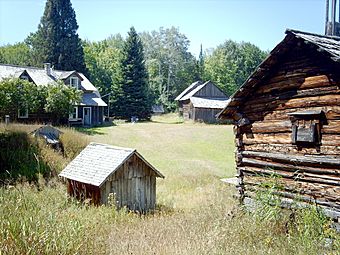Herman and Anna Hanka Farm facts for kids
Quick facts for kids |
|
|
Hanka Homestead
|
|
 |
|
| Location | Baraga Township, Baraga County, Michigan, US |
|---|---|
| Nearest city | Pelkie, Michigan |
| Area | 40 acres (16 ha) |
| Built | 1896 |
| NRHP reference No. | 84001372 |
| Added to NRHP | July 19, 1984 |
The Hanka Homestead, now called the Hanka Homestead Finnish Museum, is a unique place in Michigan. It features eight historic buildings on a 40-acre farm. You can find it about 3 miles west of U.S. Highway 41, near Pelkie, Michigan. This special farm was added to the National Register of Historic Places in 1984. It helps us understand how people lived and farmed over a hundred years ago.
Discover the Hanka Homestead!
The Hanka Homestead tells the story of a Finnish immigrant family. They lived and worked on this farm from 1896 until 1966. Many people from Finland moved to the United States around that time. They often settled in places like Michigan's Upper Peninsula, looking for new opportunities. This farm is important because it looks almost exactly as it did in the 1920s. It shows us what farming life was like in the late 1800s. It also highlights how Finnish building traditions came to America.
Today, the farm has been carefully restored. It looks just like it did in the 1920s. You can visit the Hanka Homestead Finnish Museum to see it for yourself! The museum is open from Memorial Day through Labor Day. You can take a guided tour on Tuesdays, Thursdays, Saturdays, and Sundays from noon to 4 PM. If you visit at other times, you can still explore the farm with a self-guided tour.
Exploring the Farm Buildings
The Hanka farm covers 40 acres of land. In the 1920s, it had 11 buildings and other important features. The Hanka family built all the main buildings themselves. They used strong, hand-hewn logs.
Some of the original buildings from around 1896 include:
- The farmhouse, where the family lived.
- A hay barn, used to store food for animals.
- A traditional Finnish sauna, for bathing and relaxation.
Over the years, more buildings were added. These include a woodshed, an outhouse, and a horse barn built around 1914. There's also a root cellar from about 1902, used to store food. Other buildings included a blacksmith shop, a cattle barn from 1910, and a milkhouse. The farmhouse even had an addition built before 1915, making it larger for the family.



